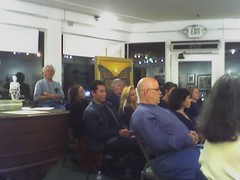The art gallery was full of amazing paintings this month! I briefly met Teresa Hsu and admired her huge paintings of rocks… the sort of thing I wish I could capture when I’m staring into a clear stream at wet pebbles, very beautiful. Then, as I was setting up chairs for the reading, I ran into a wire sculpture of the gorilla. The gorilla won. Ph33r the gorilla! Susan, the gallery owner, helped me to tape my bleeding nipple back onto my body with bandaids, and a fierce adrenaline rush fueled my MC-ing for the rest of the evening. Who knew I’d get a free piercing?! Just one of the perks of the job.
Dolores Hayden opened up the evening with poems from her recent book American Yard. I scribbled down some lines, but since she gave me a copy of the book (Thanks!) I can fill out this bit from “For Rent” that struck me:
…long views expand,
command wide axes everywhere,
entice your kind of hairpin vision,
a swaying wide and cambering in.
Maybe just because I like the word “cambering”, back from when I had a wheelchair with cambered wheels. Camber, limber, lumber, climber, words that seem clumsy but instead – nimble. “Hairpin” in close proximity to “camber” made weird neurons fire. I was also superenthralled by “Target Practice”, a multilingual poem about crows in Grenada, which I heard as a complex noticing of racism and misogyny… or we could say “race and the feminine” but hey. It’s a fabulous poem. I might talk about it at the ALTA conference at the panel on multilingual poetry.
Kate Evans read as the second featured poet of the evening, mostly from her very very recent book, Like All We Love. The first section, and first poem, “First”, focused in on mortality… Kate commented that a lot of poems were about being in bed, sex and death, you know… and there were cheers and hoots from the other poets, of “Right on!” She read a long poem about her father, her suburban childhood, and her father’s illness & dying. I most enjoyed the poems from the middle section – or were they from “Fluid Self” ? – on Ginger from Gilligan’s Island & on the Wizard of Oz, but that’s because I’m shallow. Her “Diet Poem” was a whole different animal, very oral, very spoken-wordy, excellent out loud, playful and thoughtful.
So, wow! What a nice result from my call for poets on the WOMPO women’s poetry mailing list. When I did that call, I noticed that about the first 5 or 6 people to write to me were men. I was not specifically looking for women for any reason – I just asked because that’s the poet list I’m on that I like the most – But think about that for a bit for what it was. Perfectly nice men – but they rush forward without doubt or hestitation for self promotion in a context that is in theory focused on women and their work. For example, were I on a poetry list for gay men of color, which existed to discuss gay men’s poetry and aesthetics and history and to promote their work, and someone asked for poets on that list, I might *think twice* about answering… And if as the person making that call I got my first 5 answers from straight white women, I’d be perturbed… And so I was very happy when a few days later, the emails from women poets began to come to my inbox.
We had a break, with Steve Arntson playing Chopin and Mozart for us on the grand piano with his usual delicacy and passion. Whenever he plays Chopin I freak out and travel back in time to when I was 13 or 14 and playing that stuff, picking out complicated nocturnes and frisking through waltzes, preludes, mazurkas; while for me it was a joy to exert this immense effort to manifest a tiny percent of what I felt, for Steve it seems more like breathing – he plays so effortlessly and beautifully. It’s a pleasure to hear. (But also makes me SO jealous.) Oh, and he brought the fanciest cake ever, with fruit and whipped cream and white chocolate painted with stenciled designs – delicious! Thanks, man!
I talked with Brenda about the next issue of Composite: Multiple Translations, and then ended up somehow spouting off to Dolores about my enormous Anthology. She was intrigued and very encouraging, saying wild things like “But, you should send queries to the Oxford University Press! To Norton! A perfect textbook! Important!” Which was sort of like hearing someone say “You should, of course, just fly to Mars! The Martians will crown you as their Queen!”
Anna Coulter started off the open mic session with some poems from her new art book, which I think is called “Transformations”. She’s having a show at Art21 next month, which will intersect with our Art21 poetry reading! Jane Kos read “Corrido” and announced the next meeting of the Redwood City Not Yet Dead Poets Society. I should mention here that the NYDPS founder Anatole Lubovich – and I’ve written about his poems, and his death, here before – Anyway – you can and should order his “Selected Poems” published posthumously – from booknest@sbcglobal.net, the Book Nest in Los Altos. What an amazing guy, and I still miss him a lot in all our poetry scenes on the Peninsula!
Rob Neville read “The Barrel of a Gun”, about violence, guns, and cancer. Brenda Simmons read another poem that had bullets in it and that I really loved – and thought to myself that it’s been at least a year since I’ve heard her read and her work is going in some interesting directions – more compressed, more saturated – but I didn’t write down any lines, unfortunately. Steve Arntson recited a huge chunk of a long poem about the Lewis and Clark River, another geographical historical philosophical exploration of reality and fiction, as usual exploding my mindscape!! David Cummings (I was so waiting for him to read, and hoping Dolores would not read, because I felt that they would especially like each others’ work!) really outdid himself with amazing excellence in a long poem, I didn’t catch the name – “as if mysteriously roused from the drifts of a greening sleep – ” More bullets and war and death and catastrophe and subtleties piled on top of each other so that listening was like deciphering sedimentary strata after millions of years and several earthquakes. It was some good stuff, I’m telling you.
Susan, the gallery owner, read a beautiful piece about realizing you’re not lost in the forest – the trees know where they are and where you are. It was a nice reminder for me to chill and walk with the flow of life as it happens. I read two of my translations of poems by Carmen Berenguer, because I’m totally in love with her lately, and translating her is a freaked-out violent joy. Read from “Bala humanitaria” (“Humanitarian bullet”), continuing the theme of bullets and war, so appropriate since we’re perpetrating an enormous criminal horrible war at the moment in this country; and “Mollusk” which is lighter but super fun to read out loud: it’s about, well, “about”… femininity and performativity and capitalism and objectification and violence against women – while being short, deceptively simple, and funny. I should try to memorize it for the Declamacion at the ALTA conference.
Talked a tiny bit with Dolores’ husband Peter, who is a sociologist and novelist. When he said he wrote about Africa and also young adult fiction I suddenly was like “OMFG am I talking to
Peter Dickinson, say it is not so!” No… it was not so. That really would have been too much for my brain to handle. But I’ll look for his books.
What a nice time I had – I felt happy and in a loving poets’ community – I only wish more of the “usual suspects” had showed up this month, because they would have enjoyed the features and been enjoyed in return. Though it was a small reading, we definitely had critical mass in the party sense, with the jazz going, the wine flowing, people all talking, and a nice feeling of convivial bohemian artiness, wine-and-cheese-party palo alto style.
That’s enough, I think!

